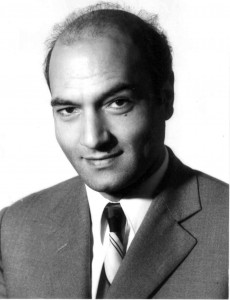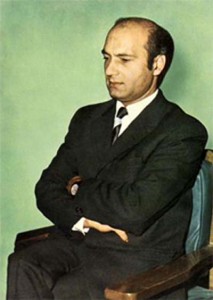 Ali Shariati (1933-1977), an Iranian revolutionary intellectual and sociologist, was one of the key intellectual leaders of the Islamic revolution 1979. Shariati was born in Khorasan, North East of Iran; a young member of a well-known family received religious education from his father and also studied at the University of Mashhad. As a young scholar and political activist against the Pahlavi monarchy, he was imprisoned several times during his life. After his first arrest, he travelled to France and received a PhD from Sorbonne. During his residence in Paris, he met several leading European thinkers such as Louis Massignon (1883-1962) and Georges Gurvitch (1894-1965) while Jacques Berque (1910-1995) was his academic mentor.
Ali Shariati (1933-1977), an Iranian revolutionary intellectual and sociologist, was one of the key intellectual leaders of the Islamic revolution 1979. Shariati was born in Khorasan, North East of Iran; a young member of a well-known family received religious education from his father and also studied at the University of Mashhad. As a young scholar and political activist against the Pahlavi monarchy, he was imprisoned several times during his life. After his first arrest, he travelled to France and received a PhD from Sorbonne. During his residence in Paris, he met several leading European thinkers such as Louis Massignon (1883-1962) and Georges Gurvitch (1894-1965) while Jacques Berque (1910-1995) was his academic mentor.
The crucial turning point for him was during his last years in Paris when he worked on a theoretical approach which was a combination of Marxism, existentialism and Islam. The result of the mixture, he believed, was an Islamic as well as progressive revolutionary ideology which can assist political changes in the Middle Eastern societies (Rahnema, 2000: p. 128).
After his return to Iran, he started to reread and reinterpret the religious symbols, Quranic stories of the prophets, theological doctrines and other religious texts which used to be considered extremely ‘retrogressive’ by the dominant secular elites most of whom were influenced by the Marxist ideas; thus considered religion as nothing further than an element in the superstructure. But Shariati’s unusual intellectual project supplemented with his outstanding Persian prose and rhetoric made him the most popular thinker of the time. Vali Nasr point out, the revolution of 1979 was based on two intellectual contributions through reinterpretations of two Shia Islamic doctrines: the Imam Khomeini’s reinterpretation of Shia Messianism as an active political fight for the public good (against the traditional politically passive conception of the doctrine), on the one hand, and Shariati’s reinterpretation of martyrdom, on the other hand (Nasr, 2006: p. p. 130).
 Shariati believed that human beings, as described in the Quran, are hybrid entities in exile; between a piece of mud and a god-like creature. So the movement of the human being is from an inferior entity towards the most superior form of transcendence. Accordingly, life is the movement from the ‘satanic muddy self’ towards the ‘spiritual divine self’ which is the ‘true self’ (khishtan-e khish). Also the same is true for the public active pursuit of good aka political revolution, which is the public transition towards the rediscovery of the true self. His perception of the role of praxis in religion is encapsulated in one of his famous lines: “if religion does not work before death, it certainly will not work after it” (Shariati, 1970: p. 77).
Shariati believed that human beings, as described in the Quran, are hybrid entities in exile; between a piece of mud and a god-like creature. So the movement of the human being is from an inferior entity towards the most superior form of transcendence. Accordingly, life is the movement from the ‘satanic muddy self’ towards the ‘spiritual divine self’ which is the ‘true self’ (khishtan-e khish). Also the same is true for the public active pursuit of good aka political revolution, which is the public transition towards the rediscovery of the true self. His perception of the role of praxis in religion is encapsulated in one of his famous lines: “if religion does not work before death, it certainly will not work after it” (Shariati, 1970: p. 77).
During the 1979 revolution Michel Foucault travelled to Iran and in a series of essays for the Le Nouvel Observateur analytically described the situation. Foucault used a key term to depict the revolutionaries’ demands: political spirituality. By this term he meant “the will to create a new division of the true and the false via a new government of self and others” (O’Farrell, 2005: p. 142). Foucault at the end of one of his essays acknowledged that the possibility of such spirituality has been forgotten in the West (Foucault, 2005: p. 207) and that he does not expect the European intellectual circles to understand its importance. So he wrote: “I can already hear the French laughing, but I know that they are wrong” (Foucault, 2005: p. 209).
In those newspaper essays, Foucault also wrote that talking about political spirituality we should see the shadow that haunts the political as well as religious life in Iran; that is the shadow of the ‘invisible present’, or the shadow of Shariati who has been died two years before the revolution at 1977.
Essential Readings:
Chatterjee, K. (2011). Ali Shari’ati and the Shaping of Political Islam in Iran. London: Palgrave Macmillan.
Rahnema, A. (2000). An Islamic Utopian: a political biography of Ali Shariati. London: I. B. Tauris.
Shariati, A. (2015). Islamology. Shariati.com
Shariati, A. (2015). Red Shi’ism vs Black Shi’ism. Shariati.com. Retrieved 8 July 2015, from http://www.shariati.com/english/redblack.html
Further Readings:
Hunter, S. (2009). Islamic Reformist Discourse in Iran: proponents and prospects. In: S. Hunter, ed., Reformist Voices of Islam: mediating Islam and modernity. London: M.E. Sharpe, pp. 33-97.
Nasr, V. (2006). The Shia Revival: how conflicts within Isalm will shape the future, New York: Norton.
Foucault, M. (2005). What Are the Iranians Dreaming [Rêvent] About?. In J. Afary& K. Anderson,Foucault and the Iranian Revolution (1st ed., pp. 203-9). Chicago: The University of Chicago Press.
Questions:
Given the historical success of Shariati’s project of rejuvenating the political energy of religion for changing the world, what is the new role of religion in politics in a post-Shariati world?
Can non-believers in Islam use Shariati’s philosophical anthropology (i.e. defining human being as a God-like creature) as a legitimate sociological understanding of human being?
Submitted by Morteza Hashemi.